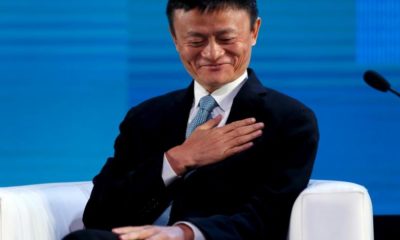China slapped a record $2.8 billion fine on Alibaba Group Holding Ltd. after an anti-monopoly probe found it abused its market dominance, as Beijing clamps down on its internet giants.
The 18.2 billion yuan penalty is triple the previous high of almost $1 billion that U.S. chipmaker Qualcomm Inc. had to pay in 2015, and was based on 4% of Alibaba’s 2019 domestic revenue, according to China’s antitrust watchdog. The company will also have to initiate “comprehensive rectifications,” from protecting merchants and customers to strengthening internal controls, the agency said in a statement on Saturday.
The fine — about 12% of Alibaba’s fiscal 2020 net income — helps remove some of the uncertainty that’s hung over China’s second-largest corporation. But Beijing remains intent on reining in its internet and fintech giants and is said to be scrutinizing other parts of billionaire founder Jack Ma’s empire, including Ant Group Co.’s consumer-lending businesses and Alibaba’s extensive media holdings.
Alibaba used its platform rules and technical methods like data and algorithms “to maintain and strengthen its own market power and obtain improper competitive advantage,” the State Administration for Market Regulation concluded in its investigation. The company will likely have to change a raft of practices, like merchant exclusivity, which critics say helped it become China’s largest e-commerce operation.
“The high fine puts the regulator in the media spotlight and sends a strong signal to the tech sector that such types of exclusionary conduct will no longer be tolerated,” said Angela Zhang, author of “Chinese Antitrust Exceptionalism” and director of Centre for Chinese Law at the University of Hong Kong. “It’s a stone that kills two birds.”
Alibaba’s practice of imposing a “pick one from two” choice on merchants “shuts out and restricts competition“ in the domestic online retail market, according to the statement.
The government action sends a clear warning to the tech sector as the government scrutinizes the influence that companies like Alibaba and social media giant Tencent Holdings Ltd. wield over spheres from consumer data to mergers and acquisitions.
The investigation into Alibaba was one of the opening salvos in a campaign seemingly designed to curb the power of China’s internet leaders and their billionaire founders. The company has come under mounting pressure from authorities since Ma spoke out against China’s regulatory approach to the finance sector in October. Those comments set in motion an unprecedented regulatory offensive, including scuttling Ant Group Co.’s $35 billion initial public offering.
Alibaba said it will hold a conference call Monday morning Hong Kong time to address lingering questions around the antitrust watchdog’s decree.
“China’s record fine on Alibaba may lift the regulatory overhang that has weighed on the company since the start of an anti-monopoly probe in late December,” Bloomberg Intelligence analysts Vey-Sern Ling and Tiffany Tam said, describing the fine as a small price to pay to do away with that uncertainty.”
Further Action
Still, it remains unclear whether the watchdog or other agencies might demand further action. Regulators are said for instance to be concerned about Alibaba’s ability to sway public discourse and want the company to sell some of its media assets, including the South China Morning Post, Hong Kong’s leading English-language newspaper.
The Hangzhou-based firm will be required to implement “comprehensive rectifications,” including strengthening internal controls, upholding fair competition, and protecting businesses on its platform and consumers’ rights, the regulator said. It will need to submit reports on self-regulation to the authority for three consecutive years.
“Alibaba accepts the penalty with sincerity and will ensure its compliance with determination. To serve its responsibility to society, Alibaba will operate in accordance with the law with utmost diligence, continue to strengthen its compliance systems and build on growth through innovation,” the company said in a statement on Saturday.
Faced Challenges
Chief Executive Officer Daniel Zhang said in a memo to employees on Saturday that Alibaba always reflected and adapted when it faced challenges. He called for unity among staff, saying the company should “make self-adjustments and start over again.”
The Communist Party-run People’s Daily newspaper said in a commentary on Saturday that the punishment involves specific anti-monopoly measures regulatory authorities take to “prevent the disorderly expansion of capital.”
“It doesn’t mean denying the significant role of platform economy in overall economic and social development, and doesn’t signal a shift of attitude in terms of the country’s support to the platform economy,” the newspaper said. “Regulations are for better development, and ‘reining in’ is also a kind of love.”


 Billionaire Watch3 weeks ago
Billionaire Watch3 weeks ago




 Startups4 weeks ago
Startups4 weeks ago


 News4 weeks ago
News4 weeks ago


 News4 weeks ago
News4 weeks ago


 Bitcoin4 weeks ago
Bitcoin4 weeks ago
 Naira4 weeks ago
Naira4 weeks ago
 Forex3 weeks ago
Forex3 weeks ago
 Treasury Bills4 weeks ago
Treasury Bills4 weeks ago
















